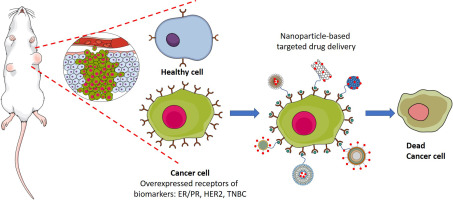当前位置:
X-MOL 学术
›
Biochim Biophys Acta Rev Cancer
›
论文详情
Our official English website, www.x-mol.net, welcomes your
feedback! (Note: you will need to create a separate account there.)
Nanoparticle-mediated targeted drug delivery for breast cancer treatment.
Biochimica et Biophysica Acta (BBA) - Reviews on Cancer ( IF 9.7 ) Pub Date : 2019-04-26 , DOI: 10.1016/j.bbcan.2019.04.006 Piumi Y Liyanage 1 , Sajini D Hettiarachchi 1 , Yiqun Zhou 1 , Allal Ouhtit 2 , Elif S Seven 1 , Cagri Y Oztan 3 , Emrah Celik 3 , Roger M Leblanc 1
Biochimica et Biophysica Acta (BBA) - Reviews on Cancer ( IF 9.7 ) Pub Date : 2019-04-26 , DOI: 10.1016/j.bbcan.2019.04.006 Piumi Y Liyanage 1 , Sajini D Hettiarachchi 1 , Yiqun Zhou 1 , Allal Ouhtit 2 , Elif S Seven 1 , Cagri Y Oztan 3 , Emrah Celik 3 , Roger M Leblanc 1
Affiliation

|
Breast cancer (BC) is the most common malignancy in women worldwide, and one of the deadliest after lung cancer. Currently, standard methods for cancer therapy including BC are surgery followed by chemotherapy or radiotherapy. However, both chemotherapy and radiotherapy often fail to treat BC due to the side effects that these therapies incur in normal tissues and organs. In recent years, various nanoparticles (NPs) have been discovered and synthesized to be able to selectively target tumor cells without causing any harm to the healthy cells or organs. Therefore, NPs-mediated targeted drug delivery systems (DDS) have become a promising technique to treat BC. In addition to their selectivity to target tumor cells and reduce side effects, NPs have other unique properties which make them desirable for cancer treatment such as low toxicity, good compatibility, ease of preparation, high photoluminescence (PL) for bioimaging in vivo, and high loadability of drugs due to their tunable surface functionalities. In this study, we summarize with a critical analysis of the most recent therapeutic studies involving various NPs-mediated DDS as alternatives for the traditional treatment approaches for BC. It will shed light on the significance of NPs-mediated DDS and serve as a guide to seeking for the ideal methodology for future targeted drug delivery for an efficient BC treatment.
中文翻译:

纳米颗粒介导的靶向药物递送用于乳腺癌治疗。
乳腺癌(BC)是全世界女性最常见的恶性肿瘤,也是仅次于肺癌的最致命的恶性肿瘤之一。目前,包括 BC 在内的癌症治疗的标准方法是手术后进行化疗或放疗。然而,化疗和放疗通常都无法治疗乳腺癌,因为这些疗法会对正常组织和器官产生副作用。近年来,人们发现并合成了各种纳米颗粒(NP),能够选择性地靶向肿瘤细胞,而不会对健康细胞或器官造成任何伤害。因此,纳米颗粒介导的靶向药物输送系统(DDS)已成为治疗乳腺癌的一种有前景的技术。除了对肿瘤细胞具有选择性并减少副作用外,纳米粒子还具有其他独特的性质,使其成为癌症治疗的理想选择,例如低毒性、良好的相容性、易于制备、用于体内生物成像的高光致发光(PL)以及高由于其可调节的表面功能,药物的负载能力。在这项研究中,我们对涉及各种 NP 介导的 DDS 作为 BC 传统治疗方法替代方案的最新治疗研究进行了批判性分析。它将阐明 NP 介导的 DDS 的重要性,并为寻找未来靶向药物递送的理想方法以实现有效的 BC 治疗提供指导。
更新日期:2019-04-26
中文翻译:

纳米颗粒介导的靶向药物递送用于乳腺癌治疗。
乳腺癌(BC)是全世界女性最常见的恶性肿瘤,也是仅次于肺癌的最致命的恶性肿瘤之一。目前,包括 BC 在内的癌症治疗的标准方法是手术后进行化疗或放疗。然而,化疗和放疗通常都无法治疗乳腺癌,因为这些疗法会对正常组织和器官产生副作用。近年来,人们发现并合成了各种纳米颗粒(NP),能够选择性地靶向肿瘤细胞,而不会对健康细胞或器官造成任何伤害。因此,纳米颗粒介导的靶向药物输送系统(DDS)已成为治疗乳腺癌的一种有前景的技术。除了对肿瘤细胞具有选择性并减少副作用外,纳米粒子还具有其他独特的性质,使其成为癌症治疗的理想选择,例如低毒性、良好的相容性、易于制备、用于体内生物成像的高光致发光(PL)以及高由于其可调节的表面功能,药物的负载能力。在这项研究中,我们对涉及各种 NP 介导的 DDS 作为 BC 传统治疗方法替代方案的最新治疗研究进行了批判性分析。它将阐明 NP 介导的 DDS 的重要性,并为寻找未来靶向药物递送的理想方法以实现有效的 BC 治疗提供指导。











































 京公网安备 11010802027423号
京公网安备 11010802027423号